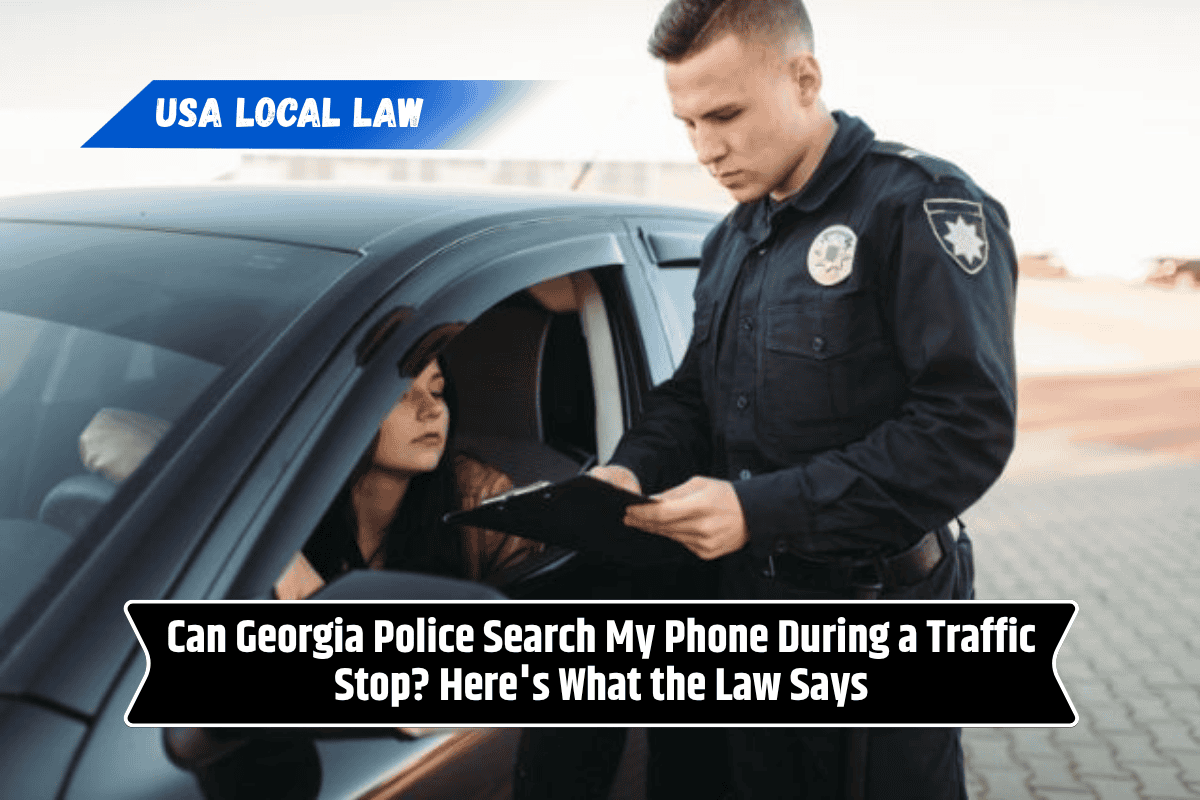In general, Georgia police cannot search your phone during a traffic stop without your consent or a warrant. The law in Georgia follows the broader principles established by the Fourth Amendment of the U.S. Constitution, which protects citizens from unreasonable searches and seizures.
For a police officer to search your phone, they typically need a legal reason—either your consent, probable cause, or a warrant.
Let’s break this down into more detail:
Consent to Search
One of the most common ways police can search your phone during a traffic stop is if you voluntarily consent to the search. If an officer asks to search your phone, you are not legally required to give your consent. You can politely refuse.
However, if you do give consent, you are allowing them to go through your phone, and any evidence they find can be used against you in court.
It’s important to remember that you have the right to refuse. If you feel uncomfortable or unsure, you can ask the officer if you are legally obligated to let them search your phone. You can say, “I do not consent to a search of my phone” if you don’t want them to go through it.
Probable Cause and Search Without a Warrant
If police have probable cause that your phone contains evidence of a crime or is related to criminal activity, they may be able to search your phone without a warrant.
Probable cause can arise in many different ways, such as if the officer sees something on your phone during the stop (like visible messages or apps related to criminal activity).
For example, if you were pulled over for suspicion of driving under the influence (DUI), and the police have reason to believe your phone may contain evidence related to the crime (such as incriminating text messages), they might argue they have probable cause to search your phone.
Warrant to Search Your Phone
If the police do not have your consent and do not have probable cause, they generally need a warrant to search your phone. A warrant is an official document signed by a judge that gives the police legal permission to conduct a search.
Without a warrant, any search of your phone is likely unconstitutional and the evidence found could be inadmissible in court.
In some cases, police may be able to quickly obtain a warrant if there is urgency (such as in situations where there is concern that evidence may be destroyed). However, this does not mean that they can simply search your phone on a whim.
The Importance of the “Privacy” of Your Phone
The U.S. Supreme Court, in the 2014 decision Riley v. California, ruled that police need a warrant to search the contents of a smartphone, even if the phone is seized during an arrest.
This landmark decision emphasized that phones are not like other objects (e.g., a wallet or purse) that can be easily searched during a stop because they contain sensitive and vast amounts of personal information.
So, if you’re pulled over during a traffic stop in Georgia, police cannot search your phone without a warrant unless you give them consent or they have probable cause.
What Should I Do if Police Ask to Search My Phone?
If an officer asks to search your phone during a traffic stop in Georgia, you have a few options:
- Politely Refuse: You are allowed to say, “I do not consent to a search of my phone.” This refusal can help protect your rights, as any evidence obtained from an unlawful search may be inadmissible in court.
- Ask for a Warrant: If the officer insists, you can ask if they have a warrant. If they don’t have one, they are not legally permitted to search your phone.
- Stay Calm and Respectful: It’s important to stay calm, polite, and respectful during the interaction. While you do not have to consent to a search, it’s helpful to remain cooperative and avoid escalating the situation.
- Consult an Attorney: If your phone is searched or seized during a traffic stop, it may be wise to consult with an attorney who specializes in criminal law. They can help determine whether your rights were violated and assist in challenging any evidence obtained from the search.
Can Police Access My Phone’s Data Without a Search?
There are certain situations where police might be able to access some information on your phone without performing a full search:
Unlocking Your Phone: In some cases, officers might ask you to unlock your phone voluntarily or provide them with the passcode. However, under Georgia law, you are not required to provide your password or unlock your phone if you do not want to.
Phone Encryption: If your phone is encrypted, police might face challenges accessing your data. However, in some instances, if law enforcement can get a warrant, they might seek assistance from phone manufacturers or forensic experts to bypass the encryption.
In Georgia, police cannot search your phone during a traffic stop without your consent, probable cause, or a warrant. While it’s always a good idea to comply with lawful requests during a traffic stop, you have the right to refuse a phone search unless the police have a valid reason or legal authorization to do so.
If you are ever in doubt, it’s always best to ask if you are legally required to allow a search and to remember that you have the right to remain silent and seek legal counsel if necessary.
Understanding your rights is essential in these situations. By knowing the law, you can protect your privacy while ensuring that your interactions with law enforcement remain respectful and lawful.
